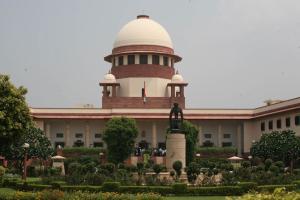The apex court is considering whether the dispute can be settled through mediation.

Supreme court
New Delhi: The Supreme Court Wednesday reserved its order on whether the politically sensitive Ram Janmabhoomi-Babri Masjid land dispute can be settled through mediation. A five-judge constitution bench headed by Chief Justice Ranjan Gogoi heard the contesting parties.
ADVERTISEMENT
Hearing begins in Supreme Court on Ayodhya Ram Janmabhoomi-Babri Masjid land dispute case. Court to decide on whether the case may be sent for court-monitored mediation to save time. pic.twitter.com/SHoTN7edL8
— ANI (@ANI) March 6, 2019
Ayodhya Ram Janmabhoomi-Babri Masjid land dispute case:Advocate Rajeev Dhavan,who is appearing for group of Muslim petitioners in the case,says, "Muslim petitioners are agreeable to mediation&any compromise or settlement will bind parties," asks bench to frame terms for mediation pic.twitter.com/tq3PsdUnHc
— ANI (@ANI) March 6, 2019
The bench also comprising Justices S A Bobde, D Y Chandrachud, Ashok Bhushan and S A Nazeer heard submissions from various Hindu and Muslim bodies involved in the matter. The apex court is considering whether the dispute can be settled through mediation. The top court had asked the contesting parties to explore the possibility of amicably settling the decades-old dispute through mediation, saying it may help in "healing relations".Fourteen appeals have been filed in the apex court against the 2010 Allahabad High Court judgment, delivered in four civil suits, that the 2.77-acre land in Ayodhya be partitioned equally among the three parties - the Sunni Waqf Board, the Nirmohi Akhara and Ram Lalla.
Catch up on all the latest Crime, National, International and Hatke news here. Also download the new mid-day Android and iOS apps to get latest updates
This story has been sourced from a third party syndicated feed, agencies. Mid-day accepts no responsibility or liability for its dependability, trustworthiness, reliability and data of the text. Mid-day management/mid-day.com reserves the sole right to alter, delete or remove (without notice) the content in its absolute discretion for any reason whatsoever
 Subscribe today by clicking the link and stay updated with the latest news!" Click here!
Subscribe today by clicking the link and stay updated with the latest news!" Click here!







